Completed evaluations
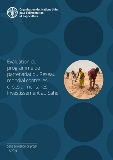
Evaluation of the Global Network Against Food Crises Partnership Program - Investment in the Sahel
07/03/2024
The adoption and institutionalization of tools and approaches developed by the Global Food Crises Network Partnership Program in the FAO portfolio has been significant. GloNet Sahel was able to lay the foundations of a learning and knowledge management practice which, however, still needs to be consolidated beyond the project. However, institutional sustainability appears unlikely and the commitment of governments to maintain capacities and assets after the end of the project remains weak.
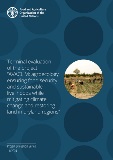
Terminal evaluation of the project “AVACLIM: agroecology, ensuring food security and sustainable livelihoods while mitigating climate change and restoring land in dryland regions”
06/03/2024
The project was found to be entirely relevant and coherent with national and global priorities in the fields of agricultural development, food security, natural resources preservation and climate change response. Overall, the strong integration of project activities into existing global and national dynamics on agroecology strengthened project effectiveness. It is likely that some of the achieved results will continue after project closure, but others require additional financial resources.
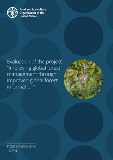
Evaluation of the project “Improving global forest management through improved global forest information”
05/03/2024
The project has clear comparative advantages and occupies a unique global niche, but differences with other forest resource assessment processes need further clarification and communication. The project has well established and functional systems of project management, but risk management practices need strengthening.
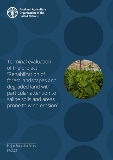
Terminal evaluation of the project “Rehabilitation of forest landscapes and degraded land with particular attention to saline soils and areas prone to wind erosion”
23/02/2024
The project aimed to strengthen capacity of local communities and institutions to plan, implement and evaluate participatory sustainable land and forest management initiatives; adopt and implement alternative livelihood options and enhance capacity to mainstream these approaches into national plans, policies and processes. The outcomes were consistent with national policies and plans, and successful in building local capacity, and influencing policy, institutional and interdepartmental linkages.
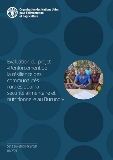
Evaluation of the project “Strengthening the resilience of rural communities for food and nutrition security in Burundi”
21/02/2024
The project strengthened technical capacities of beneficiaries of Farmer Field Schools and participated in strengthening financial and environmental viability as well as promoting endogenous community agents. The project also contributed to the empowerment of women by helping them to claim and defend their rights.

Evaluation of the project "Support for Modelling, Planning and Improving Dhaka's Food System"
14/02/2024
The project represents the most significant food system planning in a megacity undertaken to date by FAO and there are many lessons from the project that will be of benefit to other cities, countries and organizations. Key improvements were made in the food system of Dhaka and in building an enabling environment for future change. The project achieved its overall outcome to “contribute to the development of a safe, sustainable and resilient food system for the Dhaka Metropolitan Area”.

Terminal evaluation of the project “Sustainable Land Management and Climate-friendly Agriculture”
01/02/2024
The project contributed to improve the sustainability of agriculture and forest land use management in the Konya Closed Basin through low-carbon technologies and win-win benefits in land degradation, climate change and biodiversity conservation, while increasing farm profitability and forest productivity. Climate-friendly agriculture interventions and connected CO2 savings positively illustrated new approaches for sustainable land and natural resources management.
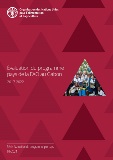
Evaluation of the FAO country programme in Gabon 2017–2022
01/02/2024
The evaluation highlights the relevance of CPE activities with regard to national issues, while highlighting notable challenges linked to weak institutional ownership and difficulties in mobilizing the necessary resources. FAO has undeniably played a significant role in rural development in Gabon, but strategic adjustments are necessary to optimize the impact of its interventions and ensure the sustainability of the results obtained.

Evaluation of the project “The Horticulture Advancement Activity” in Pakistan
31/01/2024
The project focused efforts in ten districts of Balochistan and four districts of Khyber Pakhtunkhwa to enhance competitiveness of priority horticultural value chains, creating increased jobs and income opportunities. The project implemented 1 597 grants and contributed to the overall agribusiness development of the target districts. The inclusion of women grantees is noteworthy and it increased ability to contribute to household income through small agribusiness enterprises.

Evaluation of the project "Implementing the 2030 Agenda for Water Efficiency/Productivity & Water Sustainability in the Near East and North Africa"
25/01/2024
The accomplishments of the project include the adaptation of water accounting standards in line with global and scientific criteria, the endorsement of the water–energy–food nexus approach and the development of top-tier knowledge products that have fostered knowledge sharing across these nations. More emphasis shoud be placed on continued advocacy and collaboration, bolstered commitment to the water–energy–food nexus, expansive knowledge outreach and enhanced regional partnerships.
